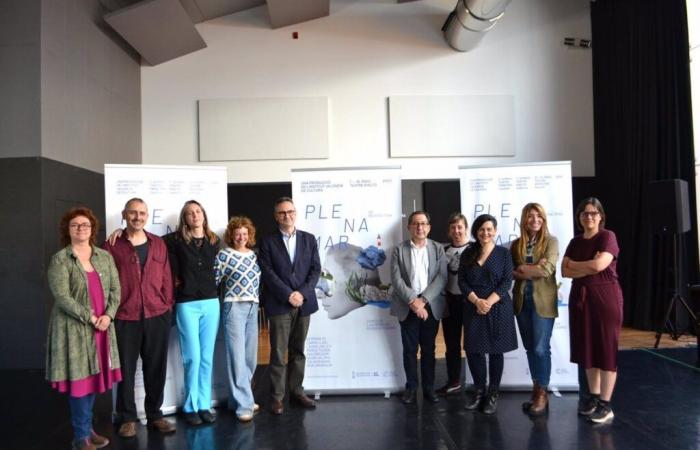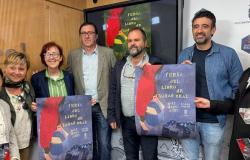The isolation and human relations plan on a story of Begoña Tena that arrives in València after its premiere in Castelló
Valencia, 6 May. (Europa Press) –
The Rialto theater hosts from Thursday until May 18 ‘Plenamar’, an “existential trhiller” written by Begoña Tena in which the dramatist explores “the resistance of human relations”, set between the fog of an island where some women “mount a convent of atheists to flee from a reality that they do not like,” the author explained.
The work is a production of the Institut Valencià de Cultura and arrives in Valencia after its premiere last weekend at the Teatro Principal de Castellón. Thus, both the premiere and production and essays have been carried out in Castellón. Then it will be from May 23 to 25 at the Teatre Arniches of Alicante.
With the direction of Laia Porcar and Nuria Vizcarro, ‘Plenamar’ stars Carme Juan, Laura Useleti, Merce Store, Pau Gregori, Silvia Valero and Talia Bobany. The work has live music created and played by Versonautas. The scenic space is directed by Anna Fonollosa, the visuals by Andreu Signes and the costume design is Marian Varela.
The author Begoña Tena explained that, when she received the IVC commission, “he had absolutely nothing in the drawer” and wrote the text of Zero. A “very intense” process in which it has “isolated from everything” to write.
This isolation is seen in the argument of the work, where Adela and Amanda, in the midst of the uncertainty of the change of the century, “assemble an atheistic convent on an island to flee from a reality that they do not like and build a new family that they choose,” said Tena. In 1999, a young woman went to the island to record a documentary about a hermit and wants to know “why people would leave everything to go there.”
“Sound dramaturgy”
The island is “one of the fundamental characters of the text.” “The friendly, the sea and the sound are there. I have been thinking about the dramaturgy of sound.
Begoña Tena, the readings of San Juan de la Cruz and María Zambrano have accompanied her during the writing, and the sea has accompanied her all her life since she was a child. The work “has some atheist mysticism.” “For me the sea is like a divine symbol, I could almost say that it is my religion, and the characters have a relationship with the religious or spiritual sea,” he said.
-From the direction of the work, Nuria Vizcarro explained that the text allows “to enter very different subjects” and “play with many scenic languages at the same time”, from audiovisual to music and lights, to tell the story proposed by Begoña Tena.
The presence of the island is seen in the tone of the actresses, in lighting and in space. According to Laia Porcar, “the scenery that plays with abstraction, there is no materialized specific space, but the idea of open spaces near the sea.” The waves, water, and interpretation play with the awareness that we are almost all the time in the outer space.
The deputy director of performing arts has stressed that, with this new production of its own, the IVC fulfills its objective of decentralizing both the cultural offer and the processes and work teams.
The permanence of literature
Asked if she would like the text to be published, Begoña Tena has indicated that she would “love.” “The theater is ephemeral, it is a living art, but the text continues and the permanence of literature is very important. In this assembly, I have made literature, non -dramaturgy of the text,” he said.
From the IVC, the Deputy Director of Performing Arts of the Intitut Valencià de Cultura, María José Mora, has pointed out during the presentation of the work that the publication of the IVC productions text “would be a path to explore”, following the wake of the dramatory insula.
Maria José Mora has highlighted the rigor, quality and beauty of writing in this piece that located in the change of the century. “Even if we take us to the past, we really see characters in an abyss of change that is what we can be living in a constant change that generates a lot of uncertainty,” he said. Thus, he has underlined “the importance of the human bond in the response to uncertainty.”
The general director of Culture, Miquel Nadal, has assured that “the work has everything”: “magnificent characters” and “full of contradictions, which try to find their way”, dialogue capacity, nuances, identifiable voices and that in the end make you reflect and excite you. “In addition, he has highlighted Tena as” a voice consolidated inside our theater scene. “
The Institut Valencià de Cultura has organized three morning functions for school groups with post-function colloquium that allows young people to know in depth and hand of artists the process of production of the work.
In addition, on May 11 there will be an accessible function for people with sensory disabilities and on May 14, a relaxed function, which allows people with non -normalized social interaction patterns or with extreme sensitivity to sensory stimuli.






